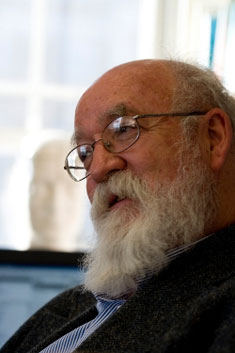High Honor for Philosopher
Daniel Dennett is named a fellow of the American Association for the Advancement of Science

“I am particularly grateful for this honor, since it signals a renewed appreciation in the scientific community for the informed collaborative efforts of philosophers,” says Daniel Dennett. Photo: Melody Ko
Daniel Dennett, a University Professor and the Austin B. Fletcher Professor of Philosophy in the School of Arts and Sciences, has been selected as a fellow of the American Association for the Advancement of Science. He was chosen for the honor for his transformational contributions to philosophy of the cognitive sciences and philosophy of biology.
“Descartes, Spinoza, Leibniz, Locke, Hume and Kant were all either scientists themselves or deeply engaged participants in the science of their age,” says Dennett. “The isolation of philosophy from science was largely a 20th-century fashion that is now happily waning, as more and more young philosophers see their research endeavors as intimately engaged with the conceptual problems that arise in the sciences. I am thus particularly grateful for this honor since it signals a renewed appreciation in the scientific community for the informed collaborative efforts of philosophers.”
Dennett, co-director of the Tufts Center for Cognitive Studies, is the author of Breaking the Spell (Viking, 2006), Freedom Evolves (Viking Penguin, 2003) and Darwin’s Dangerous Idea (Simon & Schuster, 1995), among other books.
He received a B.A. in philosophy from Harvard University in 1963. He then went to Oxford University to work with Gilbert Ryle, under whose supervision he completed a D.Phil. in philosophy in 1965. He taught at the University of California at Irvine from 1965 to 1971. He then came to Tufts, where he has taught ever since, aside from periods as a visiting professor at Harvard, the University of Pittsburgh, Oxford University and the École Normale Supérieure in Paris.
He was the co-founder in 1985 and co-director of the Curricular Software Studio at Tufts, and has helped to design museum exhibits on computers for the Smithsonian Institution, the Boston Museum of Science and the Computer Museum in Boston.
He gave the John Locke Lectures at Oxford in 1983, the Gavin David Young Lectures at Adelaide, Australia, in 1985 and the Tanner Lecture at Michigan in 1986, among many others. He has received two Guggenheim Fellowships, a Fulbright Fellowship and a fellowship at the Center for Advanced Studies in Behavioral Science. He was elected to the American Academy of Arts and Sciences in 1987.
This year, 531 members were selected as fellows of the AAAS for their scientifically or socially distinguished efforts to advance science or its applications.


